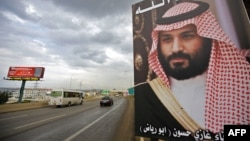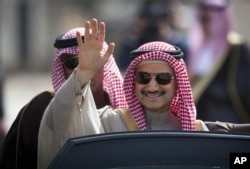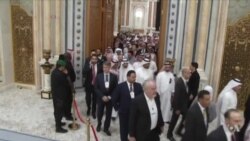The crackdown on corruption in Saudi Arabia led by Crown Prince Mohammed bin Salman has expanded to several members of the royal family, engulfing some of the richest and most powerful men in the Middle East. Many of them are major global investors and the economic fallout could extend well beyond the shifting political sands of Saudi Arabia.
Diplomats and global investors flocked to Riyadh's Ritz Carlton hotel a fortnight ago to hear the crown prince sell his dream of a new $500-billion mega-city in the Saudi kingdom, powered solely by renewable energy, a big shift away from the country's fossil fuel economy.
Secretly recorded video footage taken this week shows mattresses and blankets covering the floors of the ornate conference rooms of The Ritz Carlton hotel, which is being used as a holding pen for dozens of arrested Royal Family members and businessmen.
"To publicly humiliate and start to release details of alleged wrongdoing by members of the Royal Family and their allies in media and business is a totally new style of politics for the Al Saud family," Gulf analyst Jane Kinninmont of Chatham House. "It seems though Mohammed Bin Salman is betting that it's going to be very popular with the public."
Business establishment involved
Among those arrested is one of the world's richest men, Prince Alwaleed bin Talal, often dubbed the Warren Buffet of the Middle East.
He is a major shareholder in giant corporations like Twitter, Apple, and Citigroup. His arrest will likely spook business partners in the West "who saw him as someone who they had done their due diligence on, and who they could safely do business with. So, this will lead many to wonder, 'Are their Saudi partners safe?'" said Kinninmont.
There also are lingering questions about how far back the corruption probe will stretch. In 2010 British defense firm BAE systems pleaded guilty in a U.S. court to false accounting on a fighter jet contract worth tens of billions of dollars, a deal known as al Yamamah. But a probe by Britain's Serious Fraud Office was quashed under political pressure from London and Riyadh.
"Will old big corruption cases like the al Yamamah case for example be reopened, and cause embarrassment to prominent Western companies?" asks Kinninmont.
WATCH: Growing Fears Over Spillover From Saudi Corruption Crackdown
Possible power grab
Many see the purge as part of the 32-year-old crown prince's efforts to consolidate power. The former head of the National Guard, Prince Miteb bin Abdullah was among those detained and dismissed from his post.
"Mohammed bin Salman has brought first the defense ministry, then lately the counterterrorism and domestic intelligence services under his oversight, and the national guard is kind of the one force remaining outside of that," said Graham Griffiths of security analysts Control Risks.
Bin Salman has framed the crackdown as part of sweeping economic and social reforms under his so-called "2030 vision." Low oil prices have created a predicted 2017 budget deficit of $52 billion, which is about eight percent of GDP. Analysts say the costs of sustaining the royal family, and the largesse of the state, are no longer affordable.
"Economic growth is very weak and there is a change in the economy of the kingdom from being an oil economy into an investing economy," said independent Lebanese economist Ghazi Wazni. "And some of the main principles of the investing economy are transparency, clarity, good governance and countering corruption."
The U.S. State Department has urged Riyadh to ensure the crackdown is "fair and transparent. "President Donald Trump has praised the crown prince on Twitter, saying corrupt officials had been "milking their country for years."
"It appears that he has really bought in to Mohammed bin Salman as somebody who is business focused, who is against extremism, and who will lift Saudi Arabia into a more modern world," said analyst Kinninmont. "But yes, of course there will be many concerns within the U.S. Foreign Service and the military about the unpredictability that exists currently."
That unpredictability is engulfing the region. Sunni-led Saudi Arabia remains at war with Shi'ite Houthi rebels in Yemen, who appear to have successfully fired a ballistic missile that nearly reached Riyadh airport Saturday.
Meanwhile, it's unclear whether the United States will continue to support the Iran nuclear deal, as Congress decides whether to demand further concessions.
Analysts fear instability in both Tehran and Riyadh could exacerbate their longstanding rivalry.








